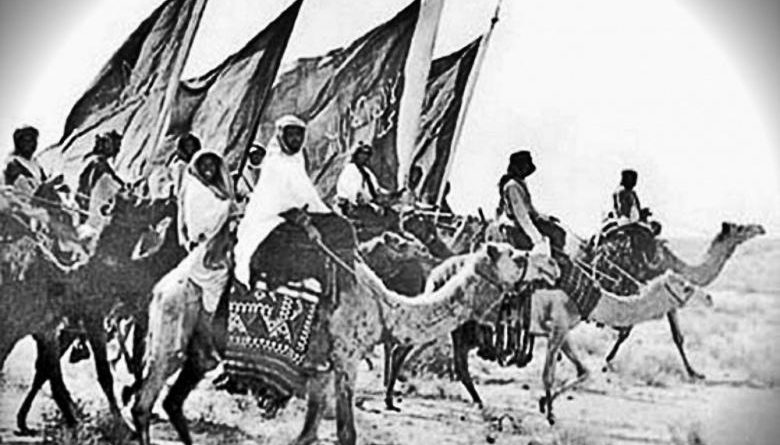MYTH-BUSTED: Ottoman Caliphate was revolted by Mohammed bin Saud and his Shaykh Mohammed bin Abdulwahab
It’s commonly spread misconception that Shaykh Mohammed bin Abdulwahab and the first Saudi ruler Mohammed bin Saud rebelled and revolted against the Ottoman Empire to demolish the Caliphate. And this has been used over the ages by Muslim Brotherhood (Ikhwanul-Muslimeen) propagandists and the Jihadi organizations to justify their revolts and protests.
Following are the excerpts of famous Scholars who debunked the myth, and clarified the matter from verified historical perspective.
When Shaykh Abdulaziz bin Abdullah bin Baz was asked about the matter, he replied.
Shaykh Muhammad bin Abdulwahab did not rebel against the Ottoman Caliphate state – as far as I know and believe. There was no governmental control or authority for the Turks over Najd.
Najd was made up of small emirates and scattered villages and upon every town or village – no matter how small they were – was an independent leader…there were emirates which had battles, wars and disputes.
Shaykh Muhammad bin AbdulWahab did not rebel against the Ottoman state, but he rebelled against the evil situation in his area, so he strove truly for the sake of Allaah and was patient and persevered until the light of the Dawah spread to other towns. — Nadwa Jadeed al-Fikr al-Islaami in the University of King Saud 1402 A.H.

When Shaykh Salih al-Fawzan was asked that, some of the people, those enemies to the Dawah of Shaykh ul Islaam Muhammad bin AbdulWahab say that Shaykh ul Islaam and the Imam Muhammad bin Saud rebelled against the rule of the leader of the Ottoman state and that they split away from Najd is the central area of mid Kingdom of Saudi Arabia Riyadh etc. obedience and this is against the creed of the Ahl ul Sunnah wal Jammah what is your opinion about this statement?
He replied.
Does this person who says this statement adhere to hearing and obeying the leader?! Most of those who say this statement hold the opinion of rebelling against leaders nowadays, and they do not adhere or acknowledge the authority of the leaders, this is one aspect.
The second aspect is that Shaykh Muhammad bin AbdulWahab and Imam Muhammad bin Saud did not rebel against the leader at their time because the Ottoman state did not have authority over the area of Najd but the area of Najd was in the hands of their leaders.
Every area from the lands of Najd had an independent leader which it would rule over. When one of them would pass away then one of his sons or relatives would take over after him, therefore, the Ottomans did not have authority over the area of Najd.
The Ottoman state did not give importance to the Najd area because there was no produce there at that time and there was no importance paid to it. The Ottomans fought against the Saudi state, however, they did not fight them because they rebelled, but rather they fought against the Saudi state out of fear of them.
Therefore, they fought against the Saudi state fearful of them, when their ability and matter had become great and their command became apparent, the Ottoman state feared them and fought against them. They feared them, and that is why they fought them, that the Saudi state may war against them in their own land, this is the purpose, otherwise they had no authority over the land of Najd.
The land of Najd was in the hands of its leaders and rulers, generation after generation until Shaykh Muhammad bin AbdulWahab came with the Dawah and Muhammad bin Saud aided him and extended out their authority over all of the Najd area and other areas of the Arabian peninsula and Allaah established them firmly because they undertook the Dawah of Muhammad peace be upon him and spread Islaam and all the emirates of Najd which were previously spread out over Najd entered under one authority, then at that time the Ottoman state feared that they would reach their land and the land of Iraq and the land of Shaam so they feared for themselves.
They also had major deviancies and they had tombs and shrines, so they feared for what they were upon. They were upon Soofeeyah and Bida’ so they feared the Dawah of the Shaykh will change them, that is why they fought against the Saudi state.
When the similar question was asked to Shaykh Saleh Alaa Shaykh that, what is your opinion about the one who says that Shaykh Muhammad bin AbdulWahab rebelled against the Ottomans, how do we refute them?
He replied.
The answer is from two angles: The first angle: It is as I mentioned to you, Najd at the time of the Shaykh was not under the authority of the Ottomans, but rather, Najd from the year 260 A.H. was not subject to their authority, not to the authority of the Abbasids or to any other authority, Najd was independent.
Some of the Khawarij tried to overcome the people of Najd from that early time and likewise a group from the people of Yemen etc. This means the people of Najd were independent and did not enter under obedience at that time.
The people of Najd were divided and did not force their people and did not surrender to giving Baya [oath of allegiance] but they were independent.
When the Ottoman state appeared every area of Najd had its own leader, so it was not subjugated under the Ottoman state because when this state first established itself, it was upon correct Islaam then after that it became deviated.
When the Shaykh [Muhammad bin AbdulWahhab] came the people were upon this condition that every area had a leader, they did not acknowledge the authority of Bani Uthmaan in contrast to al-Ahsa and the eastern provinces since these people acknowledged the authority of the Ottomans.
The leader of al-Ahsa and places like that were under the leadership of the Ottomans. Likewise, the Ashraaf [the rulers of Makkah] and those similar to them had a type of independency, but they were under the general authority of the Ottomans, as for Najd it was independent, and that is one angle.
The second aspect is that in the time of the Shaykh the Ottomans were calling to Shirk al-Akbar (major Shirk), Soofi paths and they would get the 8 people to love that. They would spend wealth upon the graves and the worship of them and spend lots of money upon that. Therefore, from this aspect if Najd was under their authority they still would not be under their obedience because they called to Shirk and they consolidated this in their last treaties.
As for the first two hundred years the Ottomans were upon the correct methodology and generally, they were good, but when it came to approximately the year 1100 A.H. and after that, when there occurred a lot of Shirk among the Muslims, the Ottomans were from those who completely aided this Shirk and spent wealth upon it.
There are statements of the Ottoman Caliphs – as was the title widely given to them – statements from the leaders of the Bani Uthmaan who wrote supplications about seeking deliverance and rescue with the Messenger peace be upon him and seeking deliverance and rescue with the Awaaliyaa etc.
The first aspect is that which is dependable as I mentioned, the second aspect is a derivation of the first.” —
Sharh Kitab Thalaat al-Asool, by Shaykh ul Islaam al-Imam the reviver Muhammad bin AbdulWahab atTameemi p.36-37
He further said.
The answer is, that this is not correct, because Najd from the year 256 A.H. was outside the rule of the Abbasid Zaydeeyah. It was out of their jurisdiction and the Abbasid state from the outset did not have any desire for it.
The Abbasids did not send anyone to the people of Najd due to what occurred in the Najd, from disunion and separation, and differences and weakness, because there was no need of Najd at that time. Then the Emirates and states came in to power but they did not request the people of Najd to enter under their authority.
The Najd had emirates and states independent from the year 256 A.H. and then around the year 500 A.H. came the end of the ‘Akhdareeyah’ state, then after that states came in to power or very small states. Every time a person established a garden or farm and people gathered around it, there occurred a leader of the state and village etc.
Then came the Imam of Dawa, Shaykh Muhammad bin AbdulWahab during these circumstances, which is that the states in Najd did not have a connection with the Ottoman state, but the Ottoman state did not give them wealth to spend upon them.
Also, the Ottoman state did not request taxes from the leaders of Najd, nor did they request them to give Baya etc. but rather Najd was abandoned due to them not having a desire for it, there was no wealth there and there was no desire for its people, but Najd was small separated areas. Shaykh Muhammad bin AbdulWahab came during this circumstances, where there was a leader of Uyainah, a leader over Huraymalah, a leader over alJubaylah, a leader over Dareeyah, a leader over Riyadh, a leader over Kharj etc. 10 each area had an independent emirate and independent authority, so he gave Dawa at this time.” —
Asilah Kashf ash-Shubahaat (1/4)
Article first appeared on MiraathPublications



